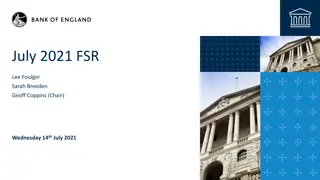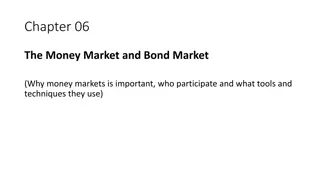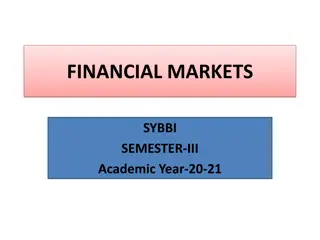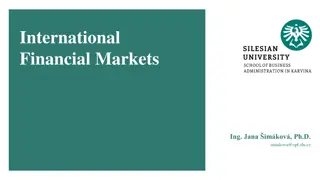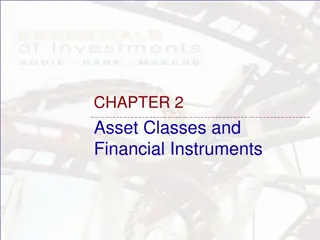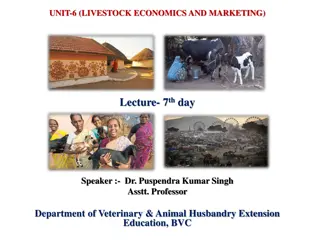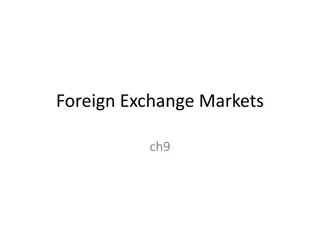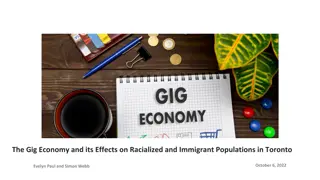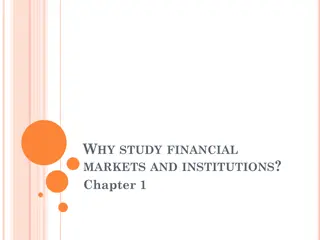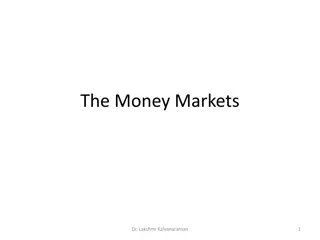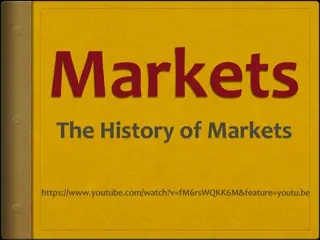Overview of Financial Markets and Their Impact on the Economy
Financial markets encompass various segments like the bond market, stock market, and foreign exchange market, each playing a vital role in the economy. Bond markets facilitate borrowing for corporations and governments, while interest rates influence investments and savings. The stock market allows for raising capital through stock issuance, affecting business decisions and individual wealth. Fluctuations in stock prices influence consumer spending and investment choices. The foreign exchange market is crucial for currency conversion and setting exchange rates between countries.
Download Presentation

Please find below an Image/Link to download the presentation.
The content on the website is provided AS IS for your information and personal use only. It may not be sold, licensed, or shared on other websites without obtaining consent from the author. Download presentation by click this link. If you encounter any issues during the download, it is possible that the publisher has removed the file from their server.
E N D
Presentation Transcript
Financial Markets A security (also called a financial instrument) is a claim on the issuer s future income or assets (Asset vs Liability-difference of perspectives) A bond is a debt security that promises to make payments periodically for a specified period. Debt or bond markets enable corporations and governments to borrow in order to finance their activities The bond market is also where interest rates are determined. An interest rate is the cost of borrowing or the price paid for the rental of funds There are many interest rates in the economy mortgage interest rates, car loan rates, and interest rates on many different types of bonds
Interest rates High interest rates could deter you from buying a house or a car because the cost of financing it would be high. Conversely, high interest rates could encourage you to save because you can earn more interest income by saving. High interest rates, might cause a corporation to postpone building a new plant that would provide more jobs. It is important to explain fluctuations in interest rates that have been substantial over the past years
The Stock Market A share of ownership in a corporation that is a claim on the earnings and assets of the corporation Issuing stock and selling it to the public is a way for corporations to raise funds to finance their activities The stock market, is the most widely followed financial market in almost every country A big swing in the prices of shares in the stock market is always a major story on the evening news People often speculate on where the market is heading It is a place where people can get rich or poor quickly
The Stock Market These considerable fluctuations in stock prices affect the size of people s wealth and as a result may affect their willingness to spend The stock market is an important factor in business investment decisions It affects the amount of funds that can be raised by selling newly issued stock to finance investment spending. A higher price means raising a larger amount of funds Stock prices are extremely volatile as evident from these figures
Foreign Exchange Market For funds to be transferred from one country to another, they have to be converted. The foreign exchange market is where this conversion takes place, so it is instrumental in moving funds between countries. It is also important because it is where the foreign exchange rate, the price of one country s currency in terms of another s, is determined.
Foreign Exchange Market A change in the exchange rate has a direct effect on consumers because it affects the cost of imports. In 2001, when the euro was worth around 85 cents, 100 euros of European goods cost $85. When the dollar subsequently weakened, raising the cost of a euro to $1.50, the same 100 euros of goods now cost $150. A weaker dollar leads to more expensive foreign goods When the value of the dollar drops, consumers decrease their purchases of foreign goods and increase their consumption of domestic goods
Foreign Exchange Market Conversely, a strong dollar means that U.S. goods exported abroad will cost more in foreign countries, and hence foreigners will buy fewer of them. Exports of steel, for example, declined sharply when the dollar strengthened in the 1980 1985 and 1995 2001 periods. A strong dollar benefited American consumers by making foreign goods cheaper but hurt American businesses and eliminated some jobs by cutting both domestic and foreign sales of their products. The decline in the value of the dollar from 1985 to 1995 and 2001 to 2007 had the opposite effect: It made foreign goods more expensive, but made American businesses more competitive. Fluctuations in the foreign exchange markets thus have major consequences for the economy.
Financial Institutions Financial institutions are what make financial markets work. Without them, financial markets would not be able to move funds from people who save to people who have productive investment opportunities The financial system is complex, comprising many different types of private-sector financial institutions Banks, insurance companies, mutual funds, finance companies, and investment banks Consumers lend to businesses indirectly through financial intermediaries
Financial Intermediaries Commercial banks, Savings and loan associations, Mutual savings banks, Credit unions, Insurance companies, Mutual funds, Pension funds, and Finance companies Borrow funds from people who have saved and in turn make loans to others
Structure of Financial Markets Debt Markets A debt instrument, such as a bond or a mortgage The maturity of a debt instrument is the number of years (term) until that instrument s expiration date. A debt instrument is short-term if its maturity is less than a year Long term if its maturity is 10 years or longer. A maturity between one and 10 years is said to be intermediate-term.
Structure of Financial Markets Equity Market Common Stock which are claims to share in the net income If you own one share of common stock in a company that has issued one million shares, you are entitled to 1 one-millionth of the firm s net income and 1 one-millionth of the firm s assets. Equities often make periodic payments (dividends) to their holders and are considered long-term securities because they have no maturity date. In addition, owning stock means that you own a portion of the firm and thus have the right to vote on issues important to the firm and to elect its directors.
Primary Markets A primary market is a financial market in which new issues of a security, such as a bond or a stock, are sold to initial buyers by the corporation or government agency borrowing the funds. An important financial institution in the primary market is the investment bank. It underwrites/ guarantees a price for a corporation s securities and then sells them to the public
Secondary Markets A secondary market is a financial market in which securities that have been previously issued can be resold The New York Stock Exchange and NASDAQ are examples of secondary markets The bond markets, in which previously issued bonds are bought and sold, actually have a larger trading volume. Other examples of secondary markets are foreign exchange markets, futures markets, and options markets. Brokers are agents of their clients/investors who trade on their behalf Dealer is a person who trades business on their own behalf
Exchanges Secondary markets can be organized in two ways. One method is to organize exchanges, where buyers and sellers of securities (or their agents or brokers) meet in one central location to conduct trades. The New York and American Stock Exchanges for stocks and the Chicago Board of Trade for commodities (wheat, corn, silver, and other raw materials) are examples of organized exchanges.
Over-the-Counter Markets The other method of organizing a secondary market is to have an over-the-counter (OTC) market Dealers at different locations who have an inventory of securities stand ready to buy and sell securities over the counter Anyone who comes to them and is willing to accept their prices can buy OTC dealers are in computer contact and know the prices set by one another
Kerb markets / Curb markets The trading of shares outside the system of official stock markets or at hours when those stock markets are closed An unofficial after-hours market in shares, bonds or commodities Curb trading occurs outside of general market operations, commonly through computers or telephones after the official exchanges have closed
Money Market The money market is a financial market in which only short-term debt instruments (generally those with original maturity of less than one year) are traded Money market securities are usually more widely traded than longer- term securities and so tend to be more liquid Short-term securities have smaller fluctuations in prices than long- term securities, making them safer investments Corporations and banks actively use the money market to earn interest on surplus funds that they expect to have only temporarily
Capital Markets Capital market is the market in which longer-term debt (generally with original maturity of one year or greater) and equity instruments are traded Capital market securities, such as stocks and long-term bonds, are often held by financial intermediaries such as insurance companies and pension funds, Since they are certain of this amount of funds that will be available in the future







